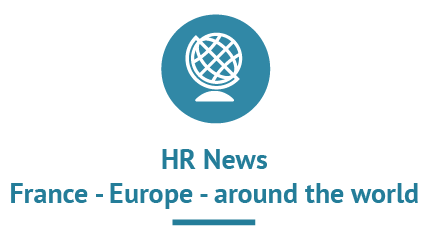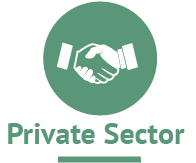|
If you are having trouble viewing this email, open it with your internet browser,
download the PDF version
or contact us.
|
 |
| #28 - October 2020 |
| PDF version - Manage your subscription - Search - Archives |

|
|
vision RH is a newsletter published by the French Directorate General for Administration and the Civil Service (DGAFP). It draws on information sources and reports issued by public administrations, the private sector, international organisations and the press, in several different languages. It aims to provide a broad view of current human resources and civil service initiatives.
|
|

|

|

|

|

|
| A carbon-neutral German federal government by 2030 | |||||
|
With the aim of serving as an example, all federal government departments have committed to stop emitting greenhouse gases two decades before the nation-wide deadline. The Federal Ministry of the Environment, which already complies with these criteria, has set up a coordination unit responsible for compiling a list of measures (buildings, travel, equipment, events, catering) and supervising their implementation. |
|||||
|
|||||
|
|
|||||

|
|||||
| Encouraging decentralisation amongst Portuguese civil servants | |||||
|
As part of the National Programme for Inland Development, the Government has introduced incentives to encourage civil servants to settle in sparsely populated areas. Employees who apply for vacant positions or who choose to work remotely from centres to be set up there will be given a bonus as well as additional holiday time. |
|||||
|
|||||
|
|
|||||

|
|||||
| JDI: a serious game to boost organisational innovation | |||||
|
The National Association of Organisational Consultants has designed JDI, a serious game to raise awareness of innovation in public and private organisations. Available free of charge (downloadable under a free licence), it has been tested by local authorities and during training courses (INET). It is based on playful and simple but effective ways to encourage participants' involvement and creativity. « It is also a game that you can very easily adapt to your needs by enriching its basic version with your own questions and challenges »
|
|||||
|
|||||
|
|
|||||

|
|||||

|

|
| A change in regional competitive exams for Italian public-sector jobs | |||||
|
New methods have been introduced in order to comply with government recruitment objectives (acceleration of hiring procedures, test harmonisation and professionalisation of the hiring process). These include online registration and preselection, knowledge of at least one foreign language (at B1 level) and psycho-technical tests (counting for 15% of the total score) that use role-playing to assess candidates' hard and soft skills. |
|||||
|
|||||
|
|
|||||

|
|||||
| 4C: a career development tool for France's hospital civil servants | |||||
|
To provide support and training for staff working in the healthcare, medical-social and social sectors, the "4C" initiative (which stands for "the Keys to Knowledge, Skills and Career" will be rolled out soon. It is specifically adapted to issues encountered by institutions and is based on the three main areas of awareness-raising, career development and training courses. |
|||||
|
|||||
|
|
|||||

|
|||||
| Skills needs in the Luxembourg administration | |||||
|
To identify the digital skills needs of government employees, a survey is being carried out in collaboration with the University of Luxembourg. It is divided into three parts (a bilingual online questionnaire, individual interviews and focus groups) and aims to collect quantitative and qualitative data on the digital transformation in the civil service, its level of maturity and the skills to be enhanced. « The institute is thus continuing its efforts in designing a training offer that meets the needs of public officials in digital matters »
|
|||||
|
|||||
|
|
|||||

|
|||||

|

|
| Civil Service Virtual Teaming: a new team performance and wellbeing learning offer | |||||
|
Challenged by the current pandemic and widespread teleworking, work collectives have to reinvent themselves. The British civil service is introducing a new learning resource consisting of a series of modules designed to strengthen team relationships by supporting both performance and well-being. Based on the PERMA (positive psychology) model, it focuses on trust and communication. |
|||||
|
|||||
|
|
|||||

|
|||||
| National study on gender equality within France's local civil service | |||||
|
Although new measures in favour of workplace gender equality will enter into force pursuant to the Act of 6 August 2019, a study led by the Management Centre for the Greater Paris region reveals the many gaps that persist and point the way to improvements. For example, although women are in the majority in the workforce, they still only account for a third of internal promotions and their pay is 19% lower than that of their male colleagues. |
|||||
|
|||||
|
|
|||||

|
|||||
| An app to improve exchanges between Dutch civil servants | |||||
|
The Dutch Administration strongly encourages staff members to undertake successive transfers during their professional careers. To facilitate this, it is launching "Functieruil", a dedicated mobile app that allows candidates to find positions corresponding to their qualifications. Once the exchange has been accepted by both parties, the HR departments can validate and implement the secondment procedure. « As a user, you directly contact colleagues wishing to discuss in the selection made to you according to your profile and your criteria »
|
|||||
|
|||||
|
|
|||||

|
|||||

|

|
| A plebiscite on flexible working in the Norwegian public sector | |||||
|
An assessment has just been conducted of the expanded range of flexible working hours in government departments (from 6 a.m. to 9 p.m.), which was introduced on 1 January 2018. Staff members, supervisors and staff representatives expressed their satisfaction with the way in which the system, which is based on individual choice, has been adopted. The number of overtime hours has been reduced in favour of ad hoc adjustments to the time worked. |
|||||
|
|||||
|
|
|||||

|
|||||
| Teleworking agreement in the Spanish administration | |||||
|
The government and unions have signed an agreement that provides a new legal framework for teleworking. Article 47 of the Basic Statute of Public Employment (EBEP) has been amended. Although employees must still submit individual requests that are subject to hierarchical approval, the agreement stipulates that an objective assessment must be carried out of the employee's duties and that he or she must follow training courses related to teleworking, and that he or she has the right to switch off outside working hours. |
|||||
|
|||||
|
|
|||||

|
|||||
| Nine inspiring approaches "for a happy public service". | |||||
|
La Fabrique Spinoza has submitted a new study to the Conseil d’Etat (France's Supreme Administrative Court), in which two ministries (Armed Forces and Culture), two regions (Île-de-France and Occitanie), one urban centre (Orléans) and various partners actively took part. It presents the results of several recent perception surveys, numerous profiles and testimonials from staff, as well as inspiring best practices from initiatives deployed throughout France. « This study highlights employees who deploy treasures of inventiveness and creativity to put happiness back at the heart of their daily lives »
|
|||||
|
|||||
|
|
|||||

|
|||||

|

|
| Smart working at Axa - a model that puts trust and results first | |||||
|
The entire economic sector is faced with the challenge of organising the working environment such that it meets employee expectations and satisfies the company's needs effectively and over the long term. To this end, the Swiss subsidiary (1) of the Axa Group has launched a new "Smart Working" agreement that will apply to all employees as soon as the current pandemic-related measures are lifted. The company has already introduced a number of flexible working solutions (including part-time job sharing), tailored to age groups and individual circumstances. These successful forays were used to define a model based on team accountability and the elimination of location requirements. Depending on departmental needs – which will be assessed at local level – in-office presence will be between 40 and 60%. Employees can, at their discretion, work the remainder of the time in a private location or coworking space, and even on a roaming basis. Events such as meetings, teamwork and sociable gatherings can be planned in order to maintain the personal contact that is essential to team-building. Every employee will receive an annual allowance of 200 Swiss francs (186 euros) to help finance optional equipment that are not covered by the employer's obligations.
|
|||||
|
|||||
|
|
|||||

|
|||||

|

|
| "Better Balance" - how Denmark is decentralising government departments | |||||
|
As in many countries, Copenhagen and its suburbs account for almost a quarter of the population. Consequently, nearly every central and national government department is located in the Danish capital. Successfully countering this trend by relocating some ministries and agencies across Denmark to be "as close as possible to citizens and businesses" is the government's ambitious goal, as set out in the two "Bedre Balance 1 & 2" (Better Balance) initiatives, overseen by the Ministry of Finance. After consulting with local authorities with a view to jointly determining local capacities, nearly 8,000 posts – i.e. more than 20% of those currently located in Copenhagen – will, by the end of 2021, be transferred to 60 towns and cities, evenly distributed across Denmark's four regions. Every government department has been involved, and each submitted a list of potential directorates and establishments. .
Twenty years ago, the country's public services introduced the concept of "digital by default". This put Denmark into the top three on the DESI (1) since the ranking was launched in 2014. Widespread broadband access and a high percentage of paperless services have made this deployment easier. Support measures for staff have been negotiated with the unions. They relate both to departing staff who have not found a position corresponding to their expectations (they are given a skills assessment and the cost of qualifying training is covered as part of a retraining initiative), and to those who agree to move to a new location. Several measures have been put in place to encourage buy-in by staff and to get them to take the plunge: • Several new structures provide customised assistance in finding accommodation, organising relocation and handling all the administrative procedures (particularly with schools) • Relocated staff are given the right to telework at least two days per week. In addition, those who wish to maintain their former residence will have their commuting time (up to one hour per day and if it is by public transport) counted as working time.
|
|||||
|
|||||
|
|
|||||

|
|||||

|
|
Share
|
||||
|
||||
| SUBSCRIBE - UPDATE YOUR SUBSCRIPTION - ARCHIVES - RSS - UNSUBSCRIBE |
|
French Directorate-General for Administration and the Civil Service (DGAFP)
Publication Manager: Nathalie COLIN Managing Editor: Nicolas de SAUSSURE Editor-in-chief and Autor: Jean-François ADRIAN Layout and graphic design: Jean-François ADRIAN and Aphania. The texts of the publication do not reflect the point of view of the DGAFP
In accordance to the French Act n°78-17 of 6 January 1978 on information technology, data files and civil liberties and to the european General Data Protection Regulation (GDPR), your personal data is stored securely and you are entitled to access, correct and delete them. To do so, you should send an e-mail to (contact-visionrh@kiosque.bercy.gouv.fr) or write to DGAFP: 139, rue de Bercy - 75012 Paris; France.
Reproduction is authorized with mention of the source © DGAFP 2020 / N° ISSN: 2606-7528. |
|
|






